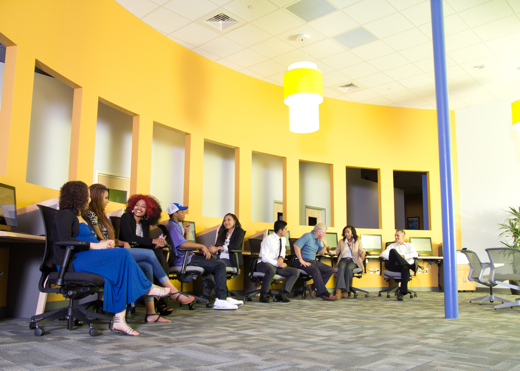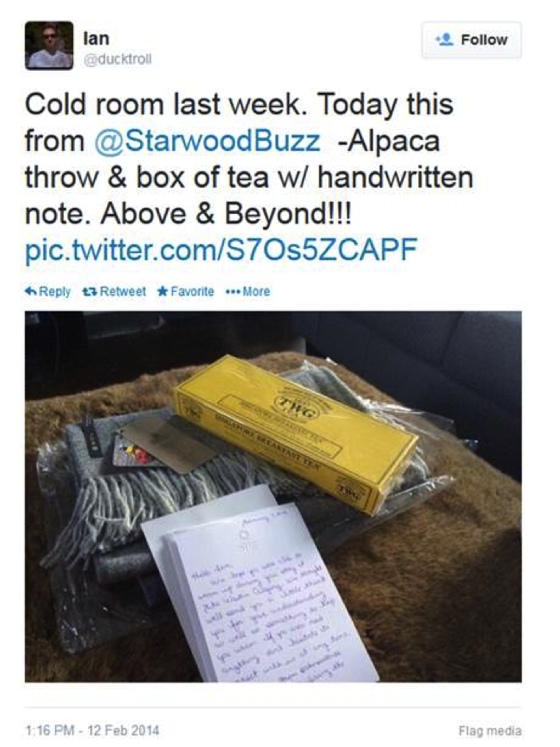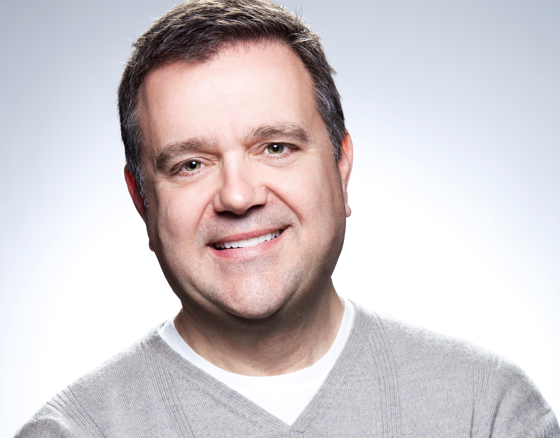With traditional hotel-call-center booking volume decreasing, Starwood Hotels & Resorts has partially repurposed its teams in locations around the world to engage guests in ways that go beyond taking a reservation.
While Starwood hotels still send more than 9 million calls each year to customer-contact centers, a small portion of its team has been retrained and redeployed to focus on customer service.
First, Starwood delivered Ambassador services for its most important customers. More recently, however, these associates at customer-contact centers have taken the lead managing social media engagement. Starwood started by redeploying four people at the main call center in Canada to monitor mentions of its brands and hotels on Facebook and Twitter. Today, about 30 people covering 11 languages 24/7 around the world read nearly 3 million pieces of social media, and response time on Twitter last year was less than 23 minutes.

Third-party data from Conversocial shows Starwood is the leader in response time on Twitter (nine minutes versus the slowest hotel brand, which clocked in at 37 hours).
Today, of all the information or alerts these associates see in their monitoring tools, they engage on about 300,000 posts a month. An engagement could be as simple as a quick one-time reply or involve multiple interactions with the guest and property teams. These numbers continue to increase at a clip of about 10% a year.
At the end of the day, according to Michael English, senior vice president, customer-contact centers and electronic distribution, the ROI on this growing initiative can be explained this way: the top 2% of Starwood’s loyalty-program members drive 30% of its revenue — and many of them are the company’s Ambassador guests, who have a highly personalized experience through one-on-one dialogue at one of Starwood’s customer-contact centers. The VIPs are being engaged, and that builds extreme loyalty.
HOTELS spoke to English to learn more about the social media engagement effort being made at the customer-contact centers.
HOTELS: How did you create this global team of social media monitors?
Mike English: It was born naturally from the talent in the 10 customer-contact centers around the world (with about 3,000 associates). All of our associates are so wired these days that it comes kind of naturally to them. They use these tools in their personal life, and more than half of what we do isn’t traditional phone. Because they are covering all time zones, now we always have “eyes on glass.” They use an aggregating tool to look at things centrally and then prioritize responses. Our monitors support the hotels creatively so they can focus on in-house guests.
HOTELS: Which social media outlets generate the most activity?
English: Facebook. But because of the global nature of our business, we are monitoring many platforms such as Weibo and WeChat. If you are going to hear about something you will hear it on Twitter first and 20 minutes later on Facebook. We monitor all of the channels and respond to as many as we can as quickly as we can. But I’d say Twitter is on the leading edge.
HOTELS: What can you share about the training for the social monitors?
English: They come in to this role after getting experience in other departments such as toll-free, email or chat with customers. As we groom them, they pick up on cues on what is important to Starwood such as differentiated experience, details and timeliness.
We select them because they have that certain special something that plays out in a social media space. The manager of the department started as a reservations associate. We saw she was creative on social media as we were friends on Facebook. When we considered a supervisor, we thought of her. She is able to share her creativity with associates.
HOTELS: Give us some fun engagement anecdotes.
English: It starts with someone who knows how to take advantage of the Starwood system and then adds creatively to deliver “surprise and delight” and work with a hotel. For example, we knew one guest was a shoe aficionado and we found a foot-tall shoe cake and delivered it with an inspiring note. A guest was on a hotel room balcony in Germany and tweeted that they locked themselves out of their room. We responded to the guest immediately, the hotel was contacted and got them off the balcony. We followed up with an English-to-German dictionary and a whistle. It all leads to engagement and chatter that is so fun in that space.

HOTELS: What is the protocol for working with hotels that have their own social media teams?
English: It differs by hotel. For example, the W Times Square has an active team, while a hotel in a secondary market might not have a big team. The customer-contact center teams and hotel teams are both looking after guests, but we do things they can’t and vise versa. We get amazing response times because we are staffed for it and very good at prioritizing the work. We have the ability centrally to focus across platforms and understand guest profiles. The property is able to do that sometimes, and they deliver the experience and be our hands by engaging guests on property. There is some overlap, but they focus on different things.
HOTELS: What is the biggest challenge of this initiative?
English: It’s a necessary challenge, but social media is drinking from the fire hose. It touches every department at Starwood. We end up engaging people across the company from corporate teams to regional operations to resolve challenges. It comes at you all the time and has a demanding pace. We are ready, but everyone in the industry realizes they have to be quick to respond as delays cause things to mushroom. If you can respond quickly you can turn the situation around.
HOTELS: How aware of the social monitoring team is everyone at Starwood?
English: It’s gone through an evolution. We circulated initial information and GMs were responding, “Who are you?” But GMs have come around fast because if unmanaged we disappoint guests. If done well, it adds to guest experience.
HOTELS: How have you tweaked the program?
English: Mostly through growth. The initial team of eight barely covered 24/7, only in English and just Twitter and Facebook. We have added platforms and people. Then we added tools to be more efficient and assign the work. This month we will read 300,000 verbatims and respond to many in one form or another.

HOTELS: Any surprises?
English: I have been in the business for 30 years, and this space is fun because you see so many different things. I am impressed with the creativity to surprise or help guests. When that gets shared in social, it’s even better.
HOTELS: What’s next?
English: Because of our scale and global nature, we will continue to add platforms. We evaluate them as they emerge to see where else we need to be to cover all of our guests. Social is a department today, but ultimately it is touching all associates in some way. Social is creeping into so many aspects of the business.
I’m sure we will add to the team and look for ways to be more efficient. Hotels are playing a bigger role, but inevitably as we grow the team will grow to keep pace.

